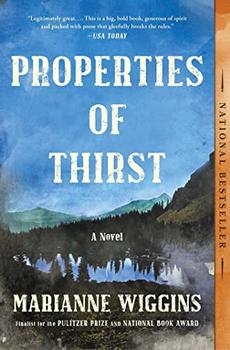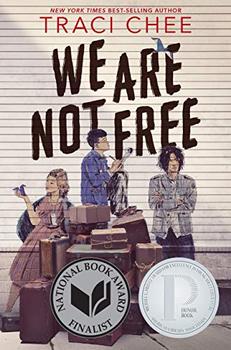Summary | Excerpt | Reviews | Beyond the book | Read-Alikes | Genres & Themes | Author Bio

Properties of Thirst, Marianne Wiggins' long-awaited ninth novel, is a sprawling story set in California's Owens Valley. Widower Rockwell "Rocky" Rhodes lives on a ranch with his twin sister, Cas, and his daughter Sunny. He is consumed by his decades-long battle with the Los Angeles Water Department, which he believes laid waste to the area's farmland with the construction of an aqueduct (see Beyond the Book). Irascible and bitter, Rocky's world is thrown into turmoil by the bombing of Pearl Harbor, where his estranged son Stryker may have been stationed aboard a U.S. Navy vessel. Adding to the confusion is the arrival of Schiff, an idealistic lawyer from the Department of the Interior tasked with building an internment camp across the road from Rocky's property on a defunct apple orchard named Manzanar.
The book's intricate plot shifts focus frequently, and it's consequently a challenge to succinctly say what, exactly, it's about. Large swaths of it address the devastation wrought by the misuse of California's water, while other chapters emphasize the challenge of creating facilities in a barren desert to accommodate 10,000 internees. A lengthy section describes a trip Sunny takes with her aunt that serves to explain how she developed a love of food and cooking, while another focuses on Stryker's fate. The author also writes at length about the plight of the Japanese Americans at Manzanar, really bringing home to readers the devastation the United States inflicted on a segment of its population. What ties these disparate plotlines together is the concept of thirst — thirst for justice, thirst for a sense of purpose, thirst for meaning, and, perhaps most crucially, thirst for love.
Wiggins' writing is lyrical and vivid throughout, almost reading like poetry at times:
"The past is carried to us on simple things — a written page, a spoon, a glove, a bowl of water: carried by the souls who touched them, those plain relics emanate a language freed of time, a language without cadence — mute and eerie as the sound a granite planet makes giving birth to mountains, coursing its way through space."
Perhaps one of the most surprising things about the book's narrative style, though, is how varied its tone is, sometimes contemplative and elegiac, occasionally gut-wrenching, and often very funny. There's one scene in particular — involving an elephant, of all things — that remarkably manages to be all three simultaneously.
The author is equally adept in her characterizations; Rocky, Sunny, Cas and Schiff leap off the page, becoming like friends — people readers come to know and love. Schiff, in particular, goes from being a fish out of water (a native Chicagoan whose only previous exercise was going up the steps of his apartment building, and for whom "eating outside" meant grabbing a hot dog at the corner vendor's cart) to a character of great depth and caring. His metamorphosis is really the heart of the novel. He at first undertakes the camp's construction feeling uneasy about his task but treating it as a job to be done. As the internees arrive at Manzanar and he gets to know them, he begins to realize how unjust their situation is and how much the government — his employer — has taken from them. As the guilt he feels over their plight increases, he goes about trying to improve their lives.
In 2016, when she was 80% finished with this novel, Wiggins suffered a stroke that left her unable to read or write. Her daughter, Lara Porzak, worked tirelessly with her to help complete the work. Her hand is undetectable — the prose is wonderful, start to finish — but the ending leaves a number of plotlines hanging. I'm not sure if that's a result of the interruption in the writing process or if it was a deliberate choice designed to make readers experience a thirst themselves, (i.e., a thirst for resolution). Regardless, I found myself stunned when I turned the last page, expecting more story only to encounter Porzak's afterword.
While the book's narrative is lush and evocative, the print layout is rather idiosyncratic. Sometimes conversations are formatted with quotes, other times not, making it challenging to determine if a statement is said out loud or just thought. The prose contains many long sentences ala William Faulkner or Virginia Woolf, with asides interjected in parentheses, making them difficult to follow. And the point of view may shift halfway through a paragraph, leading to confusion about who's thinking which thoughts. Although I felt these stylistic choices slowed the narrative and were disorienting at first, once I settled into the novel they seemed oddly appropriate.
Properties of Thirst is a worthy addition to Wiggins' canon, perhaps her best work to date. It's a big, beautiful epic that deserves wide readership, and I highly recommend it to audiences looking for first-rate literary fiction.
![]() This review was originally published in The BookBrowse Review in October 2022, and has been updated for the
June 2023 edition.
Click here to go to this issue.
This review was originally published in The BookBrowse Review in October 2022, and has been updated for the
June 2023 edition.
Click here to go to this issue.

If you liked Properties of Thirst, try these:

by Traci Chee
Published 2022
"All around me, my friends are talking, joking, laughing. Outside is the camp, the barbed wire, the guard towers, the city, the country that hates us.
We are not free.
But we are not alone."

by Leah Weiss
Published 2021
A Southern story of friendship forged by books and bees, when the timeless troubles of growing up meet the murky shadows of World War II.
Your guide toexceptional books
BookBrowse seeks out and recommends the best in contemporary fiction and nonfiction—books that not only engage and entertain but also deepen our understanding of ourselves and the world around us.